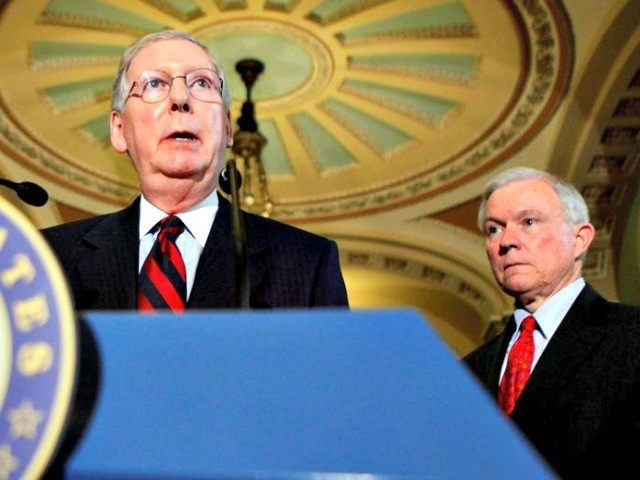While most of the political world is distracted following presidential campaign announcements on both sides of the political aisle, the GOP establishment in the U.S. Senate is working to increase America’s national debt significantly with a bill this week that doles out more taxpayer cash for doctors treating Medicare patients.
The so-called “doc-fix” legislation that Senate Majority Leader Mitch McConnell (R-KY) is aiming to take up would, according to Sen. Jeff Sessions (R-AL), add “to the deficit every single year.”
“This is why the American people don’t trust Congress,” Sessions said on the Senate floor on Monday evening.
McConnell, however, touts that the bill has bipartisan support, and that it passed the House overwhelmingly in March.
“It’s a solution to a broken Medicare payment system …it would mean an end to the annual exercise of Congress passing a temporary fix to the problem one year and then coming right back to the very same clip the next year, without actually solving the underlying problem,” McConnell said.
Nonetheless, immediately prior to the sudden House vote in March, members were given materials distributed by leadership falsely claiming the deal “pays for all new future spending” and “offsets all new spending.” Those claims have since been proven to be inaccurate, as Sessions’ office noted in a release on Tuesday that two-thirds of the $200 billion spending deal isn’t offset with cuts, and the deal will increase the national debt over 10 years by $174 billion total. A Wall Street Journal analysis found that the deal that McConnell is now pushing “makes things worse,” as well.
Sen. Ted Cruz (R-TX), the first declared 2016 GOP presidential candidate, who has since been joined as an official candidate by Sens. Rand Paul (R-KY) and Marco Rubio (R-FL), said he wouldn’t support it.
In a statement released on Tuesday morning, Cruz hammered the deal as the “Boehner-Pelosi bill” and argued it “institutionalizes and expands Obamacare policies that harm patients and their doctors while adding roughly half a trillion dollars to our long-term debt within two decades.”
“The so-called ‘SGR’ is a flawed approach that needs to be eliminated, but doing so should be a catalyst for real entitlement reform,” Cruz said. “Any deal should be fully paid for and include significant and structural reforms to Medicare that provide seniors more power and control over their health care.”

COMMENTS
Please let us know if you're having issues with commenting.